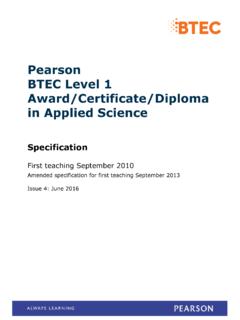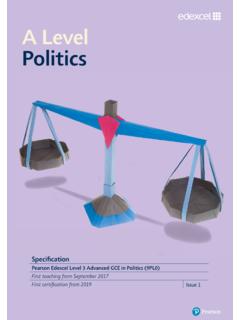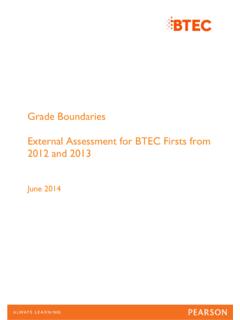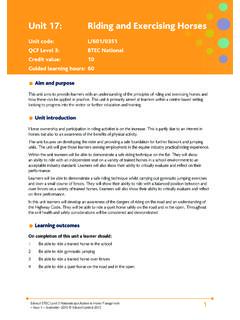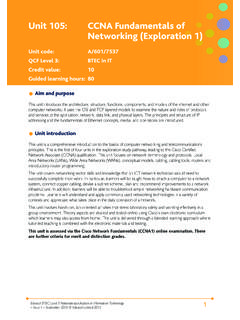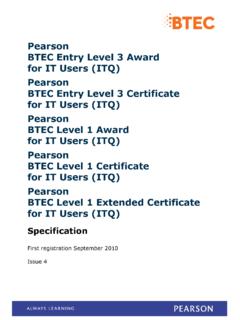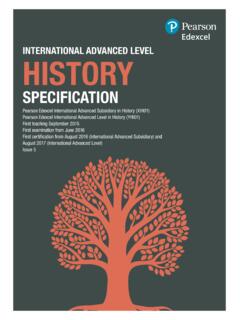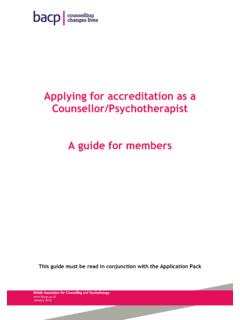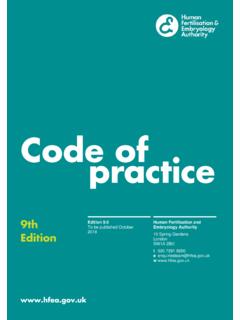Transcription of Unit 14: Understanding the Process and Experience of ...
1 978 1 446 95317 4 Pearson BTEC Level 3 Diploma in Adult Care (England) unit Issue 1 January 2018 Pearson Education Limited 2018 1 unit 14: Understanding the Process and Experience of Dementia unit reference number: R/616/7122 Level: 3 unit type: Optional Credit value: 3 Guided learning hours: 22 unit summary Dementia affects an increasing number of people. An Understanding of dementia and how to relate to someone with dementia is essential for those who work in care, and for those who have contact with members of the public as part of their working day. An Understanding of dementia will also help people who know someone affected by dementia. In this unit you will explore the various kinds of dementia, along with the neurological, psychological and physical implications dementia may have on the individual. You will learn about the impact that dementia may have on relationships and close family members, and how providing a person-centred approach to care may support and contribute to the health and wellbeing of the individual with dementia.
2 978 1 446 95317 4 Pearson BTEC Level 3 Diploma in Adult Care (England) unit Issue 1 January 2018 Pearson Education Limited 2018 2 Learning outcomes and assessment criteria To pass this unit , the learner needs to demonstrate that they can meet all the learning outcomes for the unit . The assessment criteria outline the requirements the learner is expected to meet to achieve the unit . Learning outcomes Assessment criteria 1 Understand the neurological implications of dementia Explain a range of symptoms and implications of dementia syndrome Describe the types of memory impairment commonly experienced by individuals with dementia Explain the way that individuals Process information with reference to the abilities and limitations of individuals with dementia Explain how other factors can cause changes in an individual s condition that may not be attributable to dementia Explain why the abilities and needs of an individual with dementia may fluctuate 2 Understand the impact of recognition and diagnosis of dementia Describe the impact of early diagnosis and follow up to diagnosis Explain the importance of recording possible signs or symptoms of dementia in an individual in line with agreed ways of working Explain the Process of reporting possible signs of dementia within agreed ways of working Describe the possible impact of receiving a diagnosis
3 Of dementia on: the individual their family and friends 978 1 446 95317 4 Pearson BTEC Level 3 Diploma in Adult Care (England) unit Issue 1 January 2018 Pearson Education Limited 2018 3 Learning outcomes Assessment criteria 3 Understand how dementia care must be underpinned by a person-centred approach Compare a person-centred and a non-person-centred approach to dementia care Evaluate a range of different techniques that can be used to meet the fluctuating abilities and needs of the individual with dementia Describe how myths and stereotypes related to dementia may affect the individual and their carers Describe ways in which individuals and carers can be supported to overcome their fears 978 1 446 95317 4 Pearson BTEC Level 3 Diploma in Adult Care (England) unit Issue 1 January 2018 Pearson Education Limited 2018 4 Content What needs to be learned Learning outcome 1: Understand the neurological implications of dementia Dementia syndrome Caused by a combination of conditions, sometimes called a mixed dementia.
4 Not a single disease, but a set of symptoms and signs related to multiple diseases or brain injuries. Symptoms and implications Cognitive decline, gradual deterioration of intellectual abilities. Behaviour that eventually interferes with customary daily living activities. Changes in personality and emotions. Eventually obvious to everyone, but the early stages can be difficult to detect without medical intervention. Types of dementia: o Alzheimer s disease o vascular dementia o Pick s disease o dementia with Lewy bodies (frontotemporal) o mixed dementia o Parkinson's o Creutzfeldt-Jakob disease (CJD). Memory impairment Affects all aspects of mind and behaviour, including memory, judgement, language, concentration, visual perception, temperament, and social interactions. Signs and symptoms, memory loss related to recent events, familiar faces. Confusion about the time of day, familiar objects and places, finding the right word. Types of memory impairment and processing, the brain as a whole, one part not working affects normal functioning such as: o frontal lobe includes higher intellectual functioning, planning, judging, controlling o parietal lobe includes visual perception and processing, as well as spatial navigation and reasoning o occipital lobe includes visual processing o temporal lobe includes auditory processing, language, words and memory.
5 Individual Someone requiring care or support; it will usually mean the person or people supported by the learner. 978 1 446 95317 4 Pearson BTEC Level 3 Diploma in Adult Care (England) unit Issue 1 January 2018 Pearson Education Limited 2018 5 What needs to be learned Processing information Visual processing body movement, language, spatial: o parietal lobe o temporal lobe o frontal lobe. Treatment of the brain as an entire system. Reduced level of brain functioning in one area can cause: o confusion o hallucinations o delusions o misidentifications o false beliefs o reality drifting into the past. Other factors not attributable to dementia Decline in memory, reasoning and communication. Behaviour changes. Loss of skills. Fluctuating abilities. Movement abilities and limitations. Depression. Mental health issues. Difference between dementia, depression and confusion states. Sensory changes due to age-related degeneration, macular degeneration and cataracts, loss of hearing and increase of tinnitus, reduced metabolism, osteoporosis, loss of confidence.
6 Fluctuating abilities and needs Changes to the physical environment, moving home, starting at a day centre. Changes to the social environment, changes in carers, loss of family or friends and social isolation, bereavement. Changes to the emotional environment, carers become stressed, Experience of abuse. Personal changes to include changes in treatment, in medication, in physical condition, bacterial and viral infections, vascular changes, rapidity of onset of dementia. Loss of companionship. Change of circumstance. 978 1 446 95317 4 Pearson BTEC Level 3 Diploma in Adult Care (England) unit Issue 1 January 2018 Pearson Education Limited 2018 6 What needs to be learned Learning outcome 2: Understand the impact of recognition and diagnosis of dementia Impact of early diagnosis Increase awareness of dementia and its implications. Income maximisation. Knowledge of legal implications, power of attorney, incapacity benefits. Awareness of access to: o services and types of services available o pre-diagnosis counselling services o an integrated care pathway.
7 Impact of late diagnosis of dementia Reduced quality of life, fear, lack of control, loss of dignity, loss of identity, lack of involvement, invasion of privacy, fear of losing own home, inability to communicate needs and preferences. Reduced social life, loss of friends, loss of community involvement, difficulty in dealing with own finances, attitudes of others. Impact on health, increased risk of falls, nutrition, personal hygiene, reduced exercise. Increased likelihood of abuse, emotional, neglect, physical, sexual, financial, increased likelihood of injury or harm. Recording and reporting Difference between recording and reporting. Agreed ways of recording possible signs of dementia in general and ways specific to organisation; written or electronic recording, factual, legible, dated, signed or authenticated, confidential. Importance of recording possible signs or symptoms of dementia, to highlight risk, pattern, improvement or worsening of symptoms. Agreed ways of reporting possible signs of dementia in general and specific to organisation, verbal, written, electronic.
8 Reasons for accurate, timely, and confidential reporting. Agreed ways of working Medical diagnosis. Referral pathway. Diagnostic tests. Profiling. Observation. Care planning: o pre-diagnosis o post diagnosis o follow up/continuation. Review and follow up. Continuation of care. 978 1 446 95317 4 Pearson BTEC Level 3 Diploma in Adult Care (England) unit Issue 1 January 2018 Pearson Education Limited 2018 7 What needs to be learned Process of reporting and referral Direct referral to supervisor or manager. Documentation and reporting. Meetings, with professionals: o internal o external. Case conferences. Impact of diagnosis On the individual, denial, anger, bargaining, depression, acceptance, fear, need for information, need for sources of support, including financial, and counselling. On the individual s family and friends, denial, anger, bargaining, depression, acceptance, fear, need for information, need for sources of support. Learning outcome 3: Understand how dementia care must be underpinned by a person-centred approach Person-centred approach Recognising individuality.
9 Enabling choice and social relationships. Valuing the individual. Providing the opportunity for stimulation. Empowerment. Inclusion. Looking at the person as a unified whole. Non-person-centred approach Dictating form of care to be used. Not recognising the individual s uniqueness and needs. Exclusion. Lack of choice and empowerment. Not allowing participation in decision making. Not allowing the individual to exercise their rights. Responding to behaviour rather than looking at the unified whole. Techniques to meet the fluctuating abilities and needs of the individual with dementia Approaches: o reality orientation approach o validation approach o holistic approach. Use of assistive technologies. Safe environment. 978 1 446 95317 4 Pearson BTEC Level 3 Diploma in Adult Care (England) unit Issue 1 January 2018 Pearson Education Limited 2018 8 What needs to be learned Social environment that enables positive interactions with individuals with dementia.
10 Reminiscence techniques. Appropriate exercise and activities, singing, using colour and textures, engagement activities. Dementia and stereotypes Stigmas and their impact: o those with dementia are unfortunate victims o viewing them as needing pity. Making assumptions, unable to drive, unable to conduct professional interactions. Overcoming fears Emotional support. Training: o safeguarding o balancing protection and rights o dementia training o integrated working across all services involved. Dementia support: o statutory and third sector sources of support o NHS (National Health Service) o Alzheimer s Society. Therapeutic support. Alternative therapies, aromatherapy. Maintaining health and wellbeing, diet and exercise, diet and fluids, appropriate use of medicines, support for personal care, social interaction, spiritual wellbeing, measures to reduce the risk of infection. 978 1 446 95317 4 Pearson BTEC Level 3 Diploma in Adult Care (England) unit Issue 1 January 2018 Pearson Education Limited 2018 9 Information for tutors Suggested resources Books Genova L Still Alice (Simon & Schuster, 2015) ISBN 9781471140822 Magnusson S Where Memories Go: Why Dementia Changes Everything (Two Roads, 2014) ISBN 9781444751789 Pace V, Treloar A and Scott S Dementia: From Advanced Disease to Bereavement (Oxford University Press, 2011) ISBN 9780199237807 Suchet J My Bonnie: How dementia stole the love of my life (Harper, 2011) ISBN 9780007328413 Whalley L J Understanding Brain Aging and Dementia: A Life Course Approach (Columbia University Press, 2015) ISBN 9780231163835 Websites Comprehensive information about dementia.
